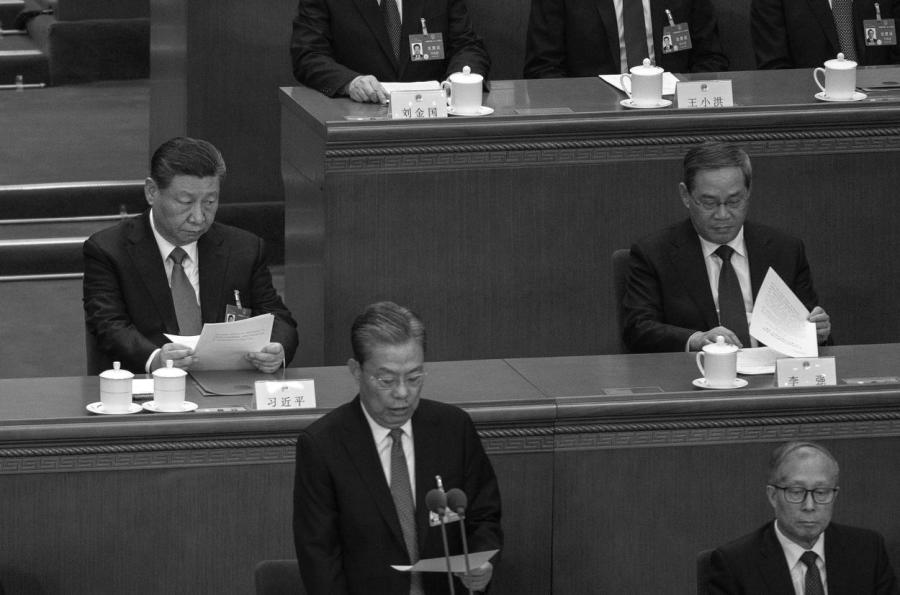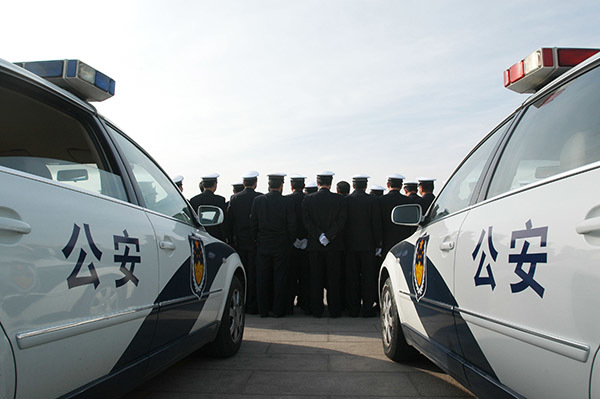File photo: Chinese Communist Party leader Xi Jinping and Premier Li Qiang (right) at the closing meeting of the National People's Congress in the Great Hall of the People. (Photo by Kevin Frayer/Getty Images)
[People News] On June 30, attention turned to a meeting of political leaders in China, which reviewed the "Regulations on the Work of the Party Central Decision-Making and Coordination Institutions." However, it was Xi Jinping's speech during the 21st collective study session of the Central Political Bureau that afternoon that carried deeper implications. In his address, Xi Jinping mentioned the term "self-revolution" 12 times. Analysts suggest that this could be Xi Jinping's way of conducting a self-examination before the entire party, potentially paving the way for his departure while seeking to remain in his position until retirement.
According to a report from the party's official media, Xinhua News Agency, the Political Bureau held two meetings on June 30. The first was to review the "Regulations on the Work of the Party Central Decision-Making and Coordination Institutions." The second meeting in the afternoon focused on enhancing the implementation of the Central Eight Regulations and establishing a long-term mechanism to address the "Four Winds." Both meetings were chaired by Xi Jinping.
The report from Xinhua indicates that in Xi Jinping's speech draft for this collective study, the term "self-revolution" was mentioned 12 times.
Jiang Feng, host of Jiang Feng's Perspective, noted that in the speeches of Chinese Communist Party leaders over the years, few have placed such emphasis on this term. "This is not merely about highlighting work priorities; it serves as a repeated reminder to oneself to repent. This is not about setting boundaries for subordinates; it is a public acknowledgement of past mistakes."
Jiang Feng believes that this is not just a collective study; it is a political self-examination meeting. This is not Xi Jinping reprimanding his subordinates; it is a letter of accountability addressed to the entire party.
In Xi Jinping's speech draft, he conveyed what is known as the 'July 1' festival greetings to all members of the Communist Party. He stated, 'Organisations and party members, regardless of their level or the work they undertake, should bear the responsibility of self-revolution. Leading cadres, especially senior cadres, must lead by example in this self-revolution.' Jiang Feng interprets Xi Jinping's sudden identification with all party members as a signal that everyone, including himself, must engage in 'self-revolution.'
Jiang Feng also noted that last year, during the 15th collective study session of the Political Bureau, Xi Jinping mentioned 'self-revolution' as well, but he emphasised that 'the party's self-revolution is always a work in progress.'
Jiang Feng analysed that last year, Xi Jinping was addressing the need for the party to undergo a revolution, with the subject being 'the organisation.' This year, however, the focus has shifted to 'I must lead by example,' with 'I' as the subject. Xi Jinping's tone has changed from a commanding stance to one of self-reflection. He has become a figure within the party who is under supervision and required to provide explanations for his actions.
In his speech draft, Xi Jinping also highlighted two key concepts: introspection and acceptance of supervision. Jiang Feng believes this reflects Xi Jinping's acknowledgement of accountability, signalling a posture statement to the elder generation and military leadership.
The article was featured on the front page on June 30, and Jiang Feng believes this serves to communicate a message to the entire party: Old Xi is preparing to bow his head; he is not here to take anyone's position. He must first ensure his own security. Additionally, it serves as a rehearsal for a scenario where, if Xi Jinping were to step down one day, it should not come as a surprise to the outside world.
Independent scholar Wu Zuo Lai shared his views on July 2 on X:
1. By personally leading the meeting, he admitted to past mistakes. The absence of procedural rules and coordinating bodies, along with a lack of consultation with elders and the Political Bureau for broader opinions, resulted in impulsive decision-making that led to this situation.
2. As stipulated in the 'Regulations on the Work of the Decision-Making and Coordination Institutions of the Party Central Committee', the coordinating body functions like a joint meeting, where various factions and retired elders have the right to express their views, particularly the opinions of senior leaders at the national level;
3. With the implementation of a system, mistakes will no longer occur, thereby creating the possibility of remaining in position until retirement.
Wu Zuo Lai specifically noted that this is in preparation for the upcoming Beidaihe meeting, and that Xi's speech draft and institutional design are the products of collective wisdom.
Recently, The Epoch Times obtained information from authoritative sources indicating that Xi Jinping, the current highest leader of the Chinese Communist Party, while still appearing to hold power, has actually lost significant influence. Key figures in China's political landscape now include CCP elders such as Wen Jiabao and Zhang Youxia, the first vice-chairman of the Central Military Commission. Reports suggest that Xi began to lose power as early as last April. Despite several attempts to regain control, including using force, all have ended in failure. Currently, Xi is merely playing along, doing whatever he is instructed to do.
Observers expect that at the Fourth Plenary Session, Xi Jinping will announce his retirement or semi-retirement.
(Originally published by People News)











News magazine bootstrap themes!
I like this themes, fast loading and look profesional
Thank you Carlos!
You're welcome!
Please support me with give positive rating!
Yes Sure!